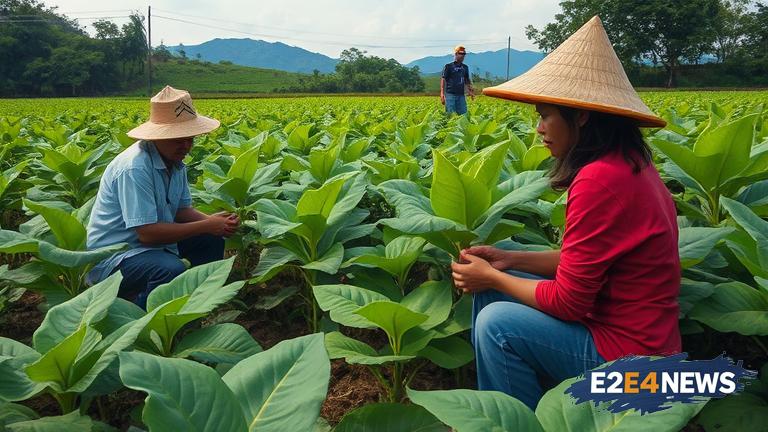The Philippines’ Mindanao region has witnessed a substantial increase in tobacco production, with output almost doubling in recent times. This surge can be attributed to the growing number of farmers who have come to realize the lucrative nature of tobacco as a cash crop. As a result, many farmers in the region have shifted their focus towards cultivating tobacco, driven by its potential for high returns. The growth in tobacco production has been a welcome development for the regional economy, providing a much-needed boost to the agricultural sector. Mindanao, known for its fertile soil and favorable climate, has proven to be an ideal location for tobacco cultivation. The region’s farmers have been able to capitalize on the crop’s cash potential, with many reporting significant increases in their income. The Philippine government has also played a role in supporting the growth of the tobacco industry, implementing policies and programs aimed at promoting the crop’s cultivation. These initiatives have helped to create a favorable environment for tobacco farmers, enabling them to increase their production and improve their livelihoods. Despite the challenges posed by the COVID-19 pandemic, the tobacco industry in Mindanao has shown remarkable resilience, with farmers adapting to the new reality and finding ways to maintain their production levels. The growth in tobacco production has also had a positive impact on the regional economy, generating employment opportunities and stimulating economic activity. As the demand for tobacco continues to grow, both domestically and internationally, farmers in Mindanao are well-positioned to take advantage of this trend. The region’s tobacco industry is expected to continue its upward trajectory, driven by the increasing demand for the crop and the support of the government. However, concerns have been raised about the environmental and health impacts of tobacco cultivation, highlighting the need for sustainable and responsible farming practices. To address these concerns, the government and other stakeholders are working to promote best practices in tobacco farming, minimizing the crop’s negative effects on the environment and public health. In addition to its economic benefits, tobacco production has also played a significant role in promoting rural development in Mindanao. By providing a source of income for farmers and their families, tobacco cultivation has helped to improve living standards and reduce poverty in rural areas. The growth of the tobacco industry has also led to the development of related industries, such as manufacturing and processing, creating new opportunities for employment and economic growth. As the tobacco industry in Mindanao continues to evolve, it is likely that we will see further innovations and developments, driven by advances in technology and changes in consumer demand. With its favorable climate and fertile soil, Mindanao is poised to remain a major player in the global tobacco industry, with its farmers and producers well-positioned to capitalize on the crop’s cash potential. The region’s tobacco industry is a testament to the power of agriculture to drive economic growth and improve livelihoods, and its continued growth is likely to have a positive impact on the regional economy and beyond. In conclusion, the growth in tobacco production in Mindanao is a significant development, driven by the crop’s cash potential and the support of the government. As the industry continues to evolve, it is likely that we will see further innovations and developments, driven by advances in technology and changes in consumer demand.





